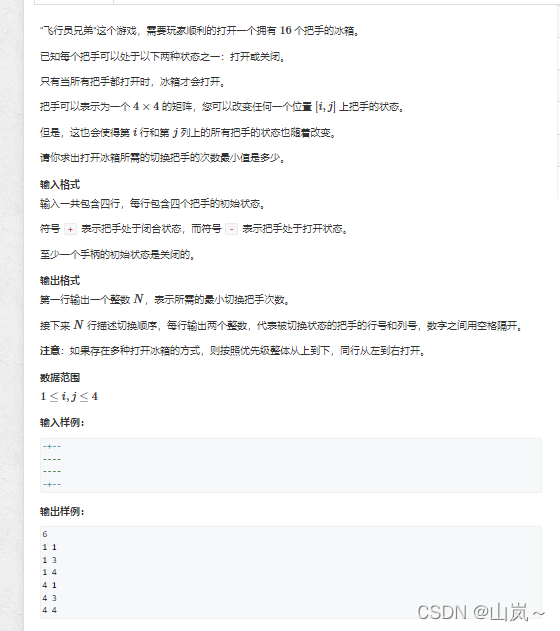|

#include <cstring>
#include <iostream>
#include <algorithm>
#include <vector>
#define x first
#define y second
using namespace std;
typedef pair<int, int> PII;
const int N = 5;
char g[N][N], backup[N][N];
int get(int x, int y)
{
return x * 4 + y;
}
void turn_one(int x, int y)
{
if (g[x][y] == '+') g[x][y] = '-';
else g[x][y] = '+';
}
void turn_all(int x, int y)
{
for (int i = 0; i < 4; i ++ )
{
turn_one(x, i);
turn_one(i, y);
}
turn_one(x, y);
}
int main()
{
for (int i = 0; i < 4; i ++ ) cin >> g[i];
vector<PII> res;
for (int op = 0; op < 1 << 16; op ++ )
{
vector<PII> temp;
memcpy(backup, g, sizeof g);
for (int i = 0; i < 4; i ++ )
for (int j = 0; j < 4; j ++ )
if (op >> get(i, j) & 1)
{
temp.push_back({i, j});
turn_all(i, j);
}
bool has_closed = false;
for (int i = 0; i < 4; i ++ )
for (int j = 0; j < 4; j ++ )
if (g[i][j] == '+')
has_closed = true;
if (has_closed == false)
{
if (res.empty() || res.size() > temp.size()) res = temp;
}
memcpy(g, backup, sizeof g);
}
cout << res.size() << endl;
for (auto op : res) cout << op.x + 1 << ' ' << op.y + 1 << endl;
return 0;
}
|
